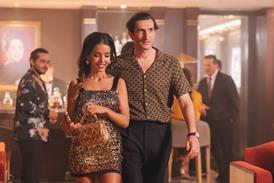Dir: Matthias Glasner. Ger.2006. 163mins.
Even audiences inured to the rigors of snail-pacedEuropean introspection face a grueling ride in Matthias Glasner'sdrama about a rapist in search of redemption.
Digitallyphotographed by the director himself in murky shades, The Free Will mostly eschews incident for sombrecontemplativeness. But, in the odd moments when Glasnercranks up the narrative, the film veers into awkward overstatement,and at the very end into (literally) screeching melodrama.
For all hisearnest ambition, it's hard not to feel that Glasnermishandles a difficult theme. Post-Berlin prospects - it played in competition- are limited, festivals with a high-art bent seeming more likely takers thancommercial buyers.
The film beginsconfrontationally, with Theo (co-writer Vogel), an unprepossessing dishwasher,violently raping a young woman by the sea. This brutal and protracted episode -which hits a wrong note with its excessively nervy tone - ends with wild-eyedTheo being apprehended by torchlight.
The film thenshifts into lower gear: nine years on, Theo - who'sshed some fat and, he hopes, his violent urges - is released from psychiatrichospital and prepares to re-enter society. Sascha (Hennicke), who oversees an ex-offenders' flat, warns Theothat life will be a struggle, and indeed it is, as the film exaggeratedlystresses by having Theo walk past sexy advertising posters on every corner.
Theo finds workin a printer's shop run by Englebrecht (Zapatka), a middle-aged man who has a difficultrelationship with his daughter Nettie (Timoteo). After he follows her to a Belgian seaside town,Theo and Nettie hit it off, and it looks as thoughshe is his passport to redemption - initially, that is.
For much of itsexorbitant running time, the film is grindingly low-key. This is partly becauseof Glasner's drab photography, which finds littlepleasure or texture in the digital format, partly because of Vogel's leadenturn as Theo. His inert sullenness is presumably designed to suggest depths of inexpressed torment; but in the opening sequence, Vogel'soverplaying is so extreme that his character never recovers.
Sabine Timoteo, on the other hand, makes the most of the film'smuted style, squeezing some fine-tuned nuance out of a generally opaquecharacter.
It's never easyto believe in the bond between the two lovers, especially since their bigmoment of emotional contact is a scene in which Theo leads Nettieto a church to woo her with a private recital of Ave Maria - conceivably an ironic touch, but risible nonetheless.
By the time thelast half hour shifts back into a darker gear, the viewer may well be toonumbed to care about what happens. An unrestrainedly emotive payoff provesgrating rather than cathartic.
Productioncompanies
Schwarzweiss Filmproduktion
Colonia Filmproduktion
Label 131
WDR
Arte
Internationalsales
Bavaria Film International
Producers
Frank Döhmann
Matthias Glasner
Christian Granderath
Jürgen Vogel
Screenplay
Matthias Glasner
Judith Angerbauer
Jürgen Vogel
Cinematography
Matthias Glasner
Editor
Mona Bräuer
Julia Wiedwald
Production design
Tom Hornig
Conni Kotte
Main cast
Jürgen Vogel
Sabine Timoteo
Andre Hennicke
Manfred Zapatka

















No comments yet